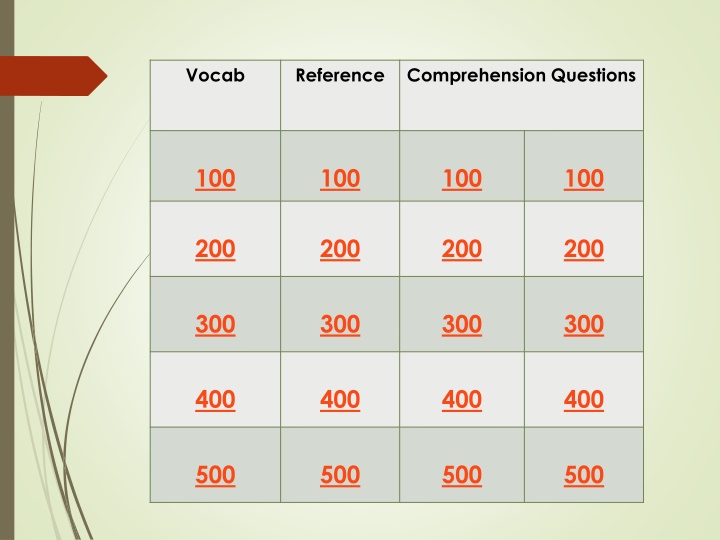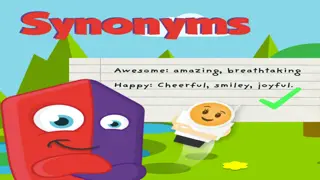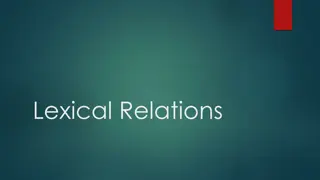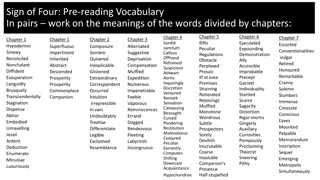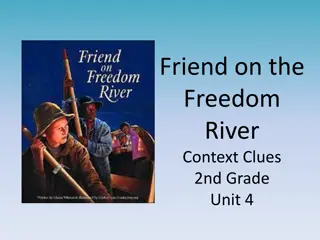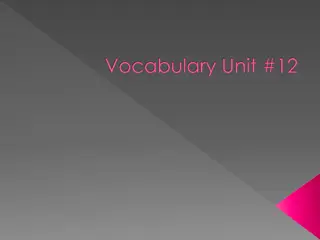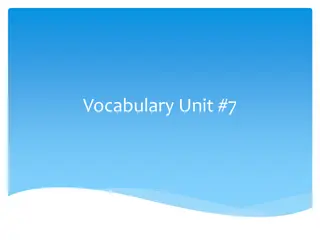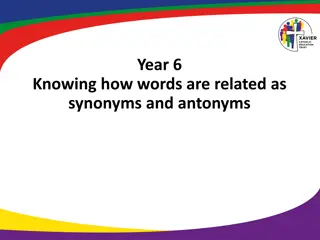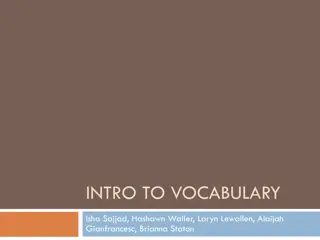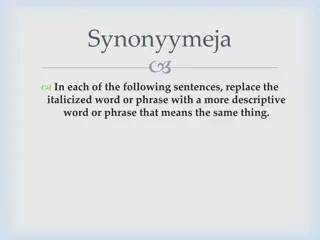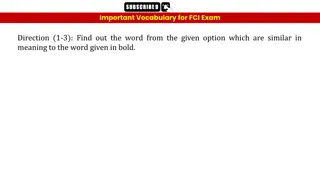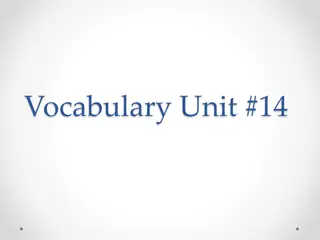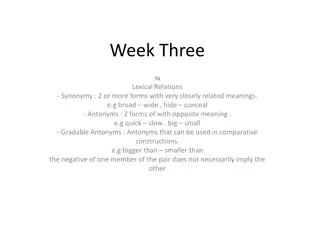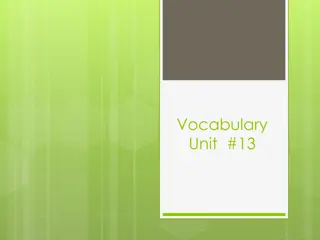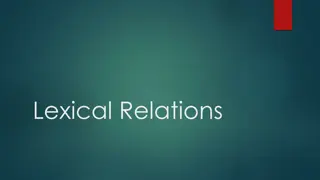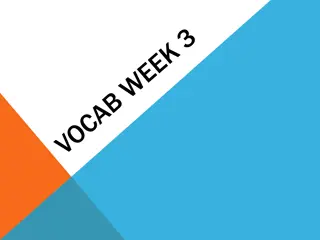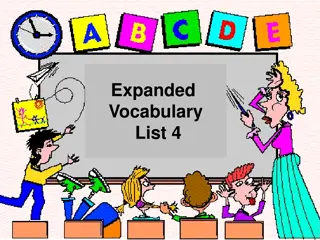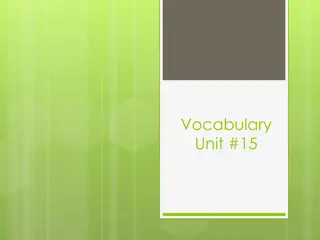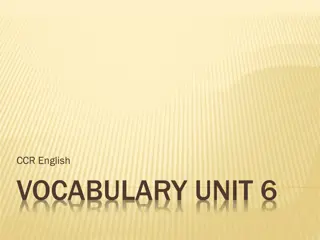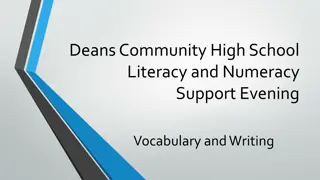Enhancing Vocabulary: Synonyms and Meanings Exploration
Discovering synonyms and meanings from a text involving vocabulary reference and comprehension questions. Words such as discreet, escalated, abolish, mainstream are explored in context, aiding in language comprehension and enrichment.
Download Presentation

Please find below an Image/Link to download the presentation.
The content on the website is provided AS IS for your information and personal use only. It may not be sold, licensed, or shared on other websites without obtaining consent from the author.If you encounter any issues during the download, it is possible that the publisher has removed the file from their server.
You are allowed to download the files provided on this website for personal or commercial use, subject to the condition that they are used lawfully. All files are the property of their respective owners.
The content on the website is provided AS IS for your information and personal use only. It may not be sold, licensed, or shared on other websites without obtaining consent from the author.
E N D
Presentation Transcript
Vocab Reference Comprehension Questions 100 100 100 100 200 200 200 200 300 300 300 300 400 400 400 400 500 500 500 500
Find a word or expression from the text which means Kept within sensible limits; silent (para. 2): __________________ 100
Find a word or expression from the text which means Kept within sensible limits; silent (para. 2): discreet 100
Find a word or expression from the text which means High in number; more, increased, greater (para. 4): __________________ 200
Find a word or expression from the text which means High in number; more, increased, greater (para. 4): escalated 200
Find a word or expression from the text which means To officially end a law, system, esp. One that has existed for a long time; to put an end to (para. 7): __________________ 300
Find a word or expression from the text which means To officially end a law, system, esp. One that has existed for a long time; to put an end to (para. 7): abolish 300
Find a word or expression from the text which means Accepted by or involving most people in a society (para. 10): __________________ 400
Find a word or expression from the text which means Accepted by or involving most people in a society (para. 10): mainstream 400
Find a word or expression from the text which means To move away from smn. or smt.(para. 11): ________________ 500
Find a word or expression from the text which means To move away from smn. or smt.(para. 11): distance 500
Determine what the following word/phrase from the text refers to Them (para 1) _____________ 100
Determine what the following word/phrase from the text refers to Them (para 1) social goals 100
Determine what the following word/phrase from the text refers to Those (para 10) _____________ 200
Determine what the following word/phrase from the text refers to Those (para 10) interests 200
Determine what the following word/phrase from the text refers to Their (para 2) _____________ 300
Determine what the following word/phrase from the text refers to Their (para 2) the powerful groups 300
Determine what the following word/phrase from the text refers to This power (para 3) _____________ 400
Determine what the following word/phrase from the text refers to This power (para 3) the power the kings lost 400
Determine what the following word/phrase from the text refers to Then (para 11) _____________ 500
Determine what the following word/phrase from the text refers to Then (para 11) when we all become fiercely media literate, ready to ask hard questions and demand convincing answers. 500
Which two factors made it possible for some people to take part in elections? 100
Which two factors made it possible for some people to take part in elections? Escalated public literacy An increase in newspaper publications 100
Why are some people disturbed by the true function of the media? 200
Why are some people disturbed by the true function of the media? Because they want the public ignorant of what is really going on/they do not want anything to upset their status quo/ they want to advance their causes. 200
The power shift from the kings to the middle class was not a fair one because _______________________ __________________________________. 300
The power shift from the kings to the middle class was not a fair one because this power shift did not give equal rights to all classes. The working class was still at a disadvantageous position. 300
How did the governments try to eliminate the forces opposing them? 400
How did the governments try to eliminate the forces opposing them? They utilized brutal force to silence those who would report what was going on by abolishing, banning or even destroying the newspaper presses. Newspaper editors were jailed or executed. 400
What did the power groups do when their efforts proved to be futile against the newspapers? 500
What did the power groups do when their efforts proved to be futile against the newspapers? They learnt to see the media as a means of reaching their own goals and protecting their interests. 500
While the newspapers governed by big businesses ________________________________, the other newspapers that have little influence in shaping the public opinion are relatively more ___________________________. 100
While the newspapers governed by big businesses serve as the mouthpiece of certain political parties, the government or big corporations, the other newspapers that have little influence in shaping the public opinion are relatively more unbiased and have an idealistic approach towards newsmaking. 100
Why did those in power in the 19th century regard the spread of working class newspapers and journals as crisis of democracy ? (para 5) 200
Why did those in power in the 19th century regard the spread of working class newspapers and journals as crisis of democracy ? (para 5) Because they informed the public about what was going on and spread democratic ideas. To the ruling class, this was unacceptable because they did not see working class as equal or enjoyed the democratic ideas since they posed a threat againts their interests. 200
Put the following events in chronological order: 1. Working class began to get organized and forced changes. 2. Legislations about children gave them the right to obtain compulsory education. 3. Power shifted from the kings to industrialists/factory owners. 4. Working class members worked under inhumane conditions. 5. A growing percentage of the population obtained the right to vote and guide the government policy. 6. Kings had the ultimate power. 7. Laws to improve the working conditions were enacted. 8. Factory owners gained economic and political power and they took advantage of the working class. 300
Put the following events in chronological order: 1. 6 2. 3 3. 8 4. 4 5. 1 6. 7 7. 2 8. 5 300
What made the newspapers of the Industrial Revolution different from others was that __________________. 400
What made the newspapers of the Industrial Revolution different from others was that the contents of these newspapers were not decrees from above but often looked at politics from the perspective of the poor and working classes of society/ They contributed greatly to the democratic ideas/ Socialists, anarchists, communists and other parties and groups could easily propagate their ideas. 400
A symbyotic relation is a close and usually obligatory association of two organisms of different species that live together, often to their mutual benefit . This idea is exemplified in the text with the relationship between _______________________ and _______________________. 500
A symbyotic relation is a close and usually obligatory association of two organisms of different species that live together, often to their mutual benefit . This idea is exemplified in the text with the relationship between the government and the media. 500
